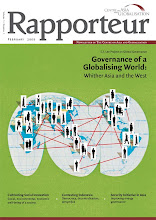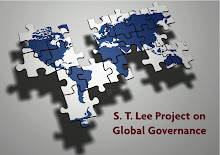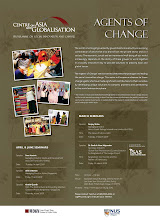 Dr Tikki Pang, Co-Chair of the S.T. Lee Project's Global Health Governance (GHG hereafter) Study Group and Director of Research Policy & Cooperation at the World Health Organisation (WHO) summarises the discussions of the various global health issues that have taken place at the recently completed 62nd Session of the World Health Assembly.
Dr Tikki Pang, Co-Chair of the S.T. Lee Project's Global Health Governance (GHG hereafter) Study Group and Director of Research Policy & Cooperation at the World Health Organisation (WHO) summarises the discussions of the various global health issues that have taken place at the recently completed 62nd Session of the World Health Assembly.1. Endorsement of WHO leadership in the context of influenza crisis:
Member States (as well as the external media) have been complimentary and largely supportive of the way WHO has handled the crisis so far. There have been a few critics, but by and large, the "erring on the side of caution" approach has been accepted by most.
In the context of the ST Lee Project's GHG, this crisis has served to reiterate the central role WHO must play in the context of global heatlh issues. The Organization's image is probably at the highest it has been for many years. Make no mistake-it could've so easily gone wrong-and kudos to the Director General Dr Margaret Chan for her decisiveness in the past month or two. The new US administration (new Health Secretary Sebelius came to Geneva) has been particularly supportive of WHO's efforts in coordinating the global response.
Another highlight was that UN Secretary General Ban Ki Moon delivered the keynote address at the Assembly-his presence is yet another signal of the good coordination across the UN during this crisis.
Finally, WHO was also urged by its Member States not to move to phase 6 alert level although, based on current criteria, this should've happened-the countries urged the Organization to re-visit the criteria and take into account other factors such as disease severity, virus pathogenicity, clinical features, etc.
2. (However) tensions still running high on the virus sharing issue:
The IGM (Inter-governmental Meeting on Sharing of Influenza Viruses) met a few days before the assembly and, unfortunately, came to no agreement after 2 years of negotiations on trying to forge an equitable framework for sharing of viruses and benefits derived from any vaccines developed. Some developing countries mentioned, for example, that developed countries have signed agreements with vaccine manufacturers for 50% of the soon-to-be-developed vaccine against influenza A (H1N1) leaving the developing world highly exposed with the remaining 50%.
The agreement of the Assembly was to ask WHO/the Director-General to "support further negotiations", especially around a standard material transfer agreement for sharing of viruses. This topic was then linked to another one on the agenda in relation to "public health, innovation and intellectual property" which also has important implications for GHG as well as GHRG (R=research), i.e. how can GHG/GHRG tackle this issue of equitable access to health products and avoid the perception of "economics always trumps health" (expressed by a delegatiion at the Assembly).
3. Continued interest in primary health care and the social determinants of health:
In the context of the "dual burden" of the global financial crisis and potential influenza pandemic, the Member States were even more concerned about the state of their national health systems. In particular, it was felt that the basis for strengthening health systems should include considerations of equity, solidarity, social justice, universal access to services, multi-sectoral action, decentralization and community participation.
Financing was obviously a big issue and some countries highlighted the fact that low-income countries in particular rely a lot on overseas development aid for their health systems-which may be reduced due to the financial crisis. This underscores the view held by some that the ultimate objective of good GHG is the strengthening of health systems in low and middle income countries. This, in turn, has direct implications for global health security more generally.
4. Inter-sectorality important in future:
The message that "health should be in all policies" was repeatedly heard during the Assembly and the Norwegian delegation, for example, quotes their minister of health who had stated that "to close the health gap between rich and poor in a generation, every minister must be a health minister". I think this is part of a larger global trend- a meeting was held recently in Asia (the Prince Mahidol Award Conference) on "Mainstreaming Health into Public Policies". Although the idea and importance of an inter-sectoral approach is clearly relevant, whether it can be extended on a practical level, e.g. to inter-agency cooperation, is an open question. For example, there was debate at the Assembly on whose role is it to take on IPR (Intellectuual Property Rights) issues related to health products (WHO? WIPO? WTO?).
5. Tuberculosis (TB):
Amidst all the excitement about influenza, Member States also agreed that antibiotic resistance, as exemplified by the ongoing problem of multidrug-resistant (MDR) and extensively drug-resistant (XDR) TB, deserves urgent attention and action. There are 500,000 cases of MDR TB and 50,000 cases of XDR TB annually (mostly in the developing world), and only 3% of patients are getting treatment according to standards recommended by WHO.
In terms of broader implications, it should be remembered that deaths during influenza pandemics in the past have been caused mainly by secondary bacterial infections (e.g. pneumonia)-so resistance to antibiotics may indeed be "the mother of all infectious disease challenges" (as expressed by one delegate).
6. Ongoing concern about support for WHO:
Dr Margaret Chan, Director General of WHO appealed to the Member States for enhanced financial support for WHO. Dr Chan reiterated that only 20% of WHO's budget comes from Member States contributions (this figure is around 80% for other UN organizations) and that the other 80% are from external donors, often highly specified for specific project areas. This, of course, compromises WHO's independence and credibility as it runs the risk of having its agenda defined by donors-in all reality, WHO is now a "soft money" organization just like academic institutions relying on external grants . This clearly has important implications in light of the expectation of WHO leadership in global health in the future. [Tikki]










No comments:
Post a Comment